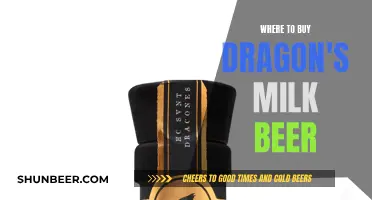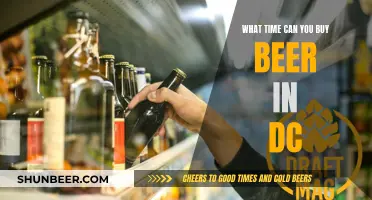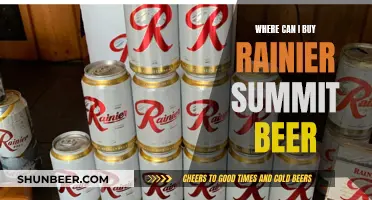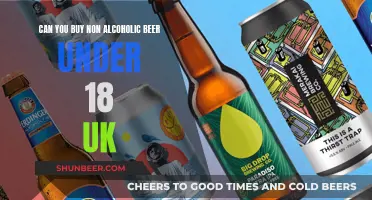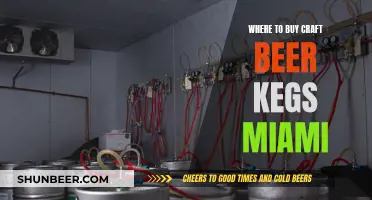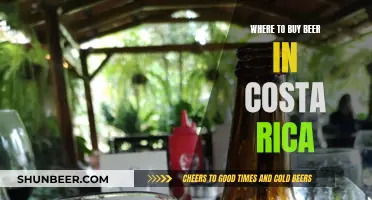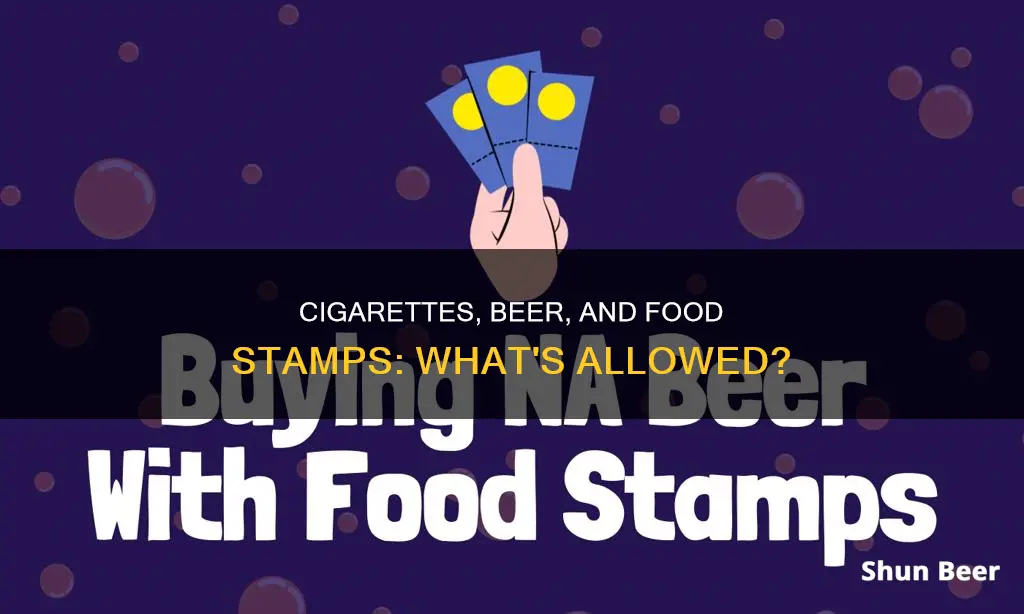
Food stamps (or SNAP) are intended to help low-income families purchase nutritious food and boost the agricultural industry. However, there are restrictions on what items can be purchased with food stamps. Beer, wine, liquor, cigarettes, tobacco, vitamins, medicines, supplements, and live animals are all prohibited items. This has been a point of contention, with some arguing that these restrictions are paternalistic and insulting to low-income individuals, while others believe it is wasteful to use taxpayer money on items that are not necessities and may be harmful to health.
| Characteristics | Values |
|---|---|
| Can you buy cigarettes with food stamps? | No |
| Can you buy beer with food stamps? | No |
What You'll Learn
- Food stamps cannot be used to buy beer, wine, liquor, cigarettes, or tobacco
- Food stamps are intended to help low-income families buy nutritious food
- Taxpayer money should not fund harmful or unnecessary items, according to lawmakers
- Restrictions are seen as paternalistic and insulting to low-income families
- Stores that allow customers to use food stamps to buy alcohol and other prohibited items can face severe penalties

Food stamps cannot be used to buy beer, wine, liquor, cigarettes, or tobacco
Food stamps are intended to help low-income families buy nutritious food and boost the agricultural industry. They can be used to buy any food for the household, including fruits and vegetables, meat, poultry, fish, and seeds and plants that produce food. However, food stamps cannot be used to buy beer, wine, liquor, cigarettes, or tobacco. These items are prohibited from purchase with food stamps because they are considered harmful to people's health and not necessities.
The rule against purchasing alcohol and tobacco with food stamps has been in place since the program's inception in 1961. This restriction is supported by lawmakers and voters who believe it is wasteful to use taxpayer money on items that are not essential and may be harmful. On the other hand, some view these restrictions as insulting to low-income individuals, assuming they are incapable of making smart choices.
Despite these differing opinions, the law remains clear: food stamps cannot be used to buy alcohol or tobacco products. If someone attempts to use food stamps to purchase these items, the transaction will be declined. Stores that allow customers to use food stamps to buy alcohol and other prohibited items can face severe penalties, including losing the privilege of accepting food stamps as a form of payment or incurring fines.
Additionally, food stamps cannot be used to withdraw cash from ATMs located at liquor stores, casinos, racetracks, or adult entertainment establishments. This restriction is in place because these locations sell alcohol and other prohibited products and services. However, once cash is withdrawn from authorized locations, it can typically be used to purchase anything, even if it is not legal to do so.
Reselling Beer: Legalities of Buying to Resell
You may want to see also

Food stamps are intended to help low-income families buy nutritious food
Food stamps cannot be used to purchase cigarettes, beer, or any other alcoholic drinks. They also cannot be used to buy vitamins, medicines, supplements, or live animals (with the exception of shellfish, fish removed from water, and animals slaughtered prior to pick-up). In addition, food stamps cannot be used for non-food items such as cleaning supplies, paper products, hygiene items, or cosmetics.
The prohibition against using food stamps to purchase alcohol and tobacco products is based on the belief that it is wasteful to use taxpayer money on items that are harmful to people's health or that are not necessities. However, some view these restrictions as paternalistic and insulting to low-income individuals and families who are capable of making their own choices.
Despite these differing opinions, the fact remains that it is not legal to purchase alcohol or tobacco with food stamps. If someone attempts to use food stamps to buy these items, the transaction will be declined. Stores that allow customers to use food stamps to purchase alcohol and other prohibited items can face severe penalties, including losing the privilege of accepting food stamps as a form of payment or incurring fines.
Overall, food stamps play an important role in helping low-income families access nutritious food, and the program has been designed with specific guidelines to ensure that it achieves its intended purpose.
Philadelphia's Sunday Beer Buying: What's the Deal?
You may want to see also

Taxpayer money should not fund harmful or unnecessary items, according to lawmakers
Taxpayer money should not be used to fund harmful or unnecessary items, according to lawmakers. This belief has informed policies regarding what items can be purchased with food stamps. Food stamps, or SNAP (Supplemental Nutrition Assistance Program), were established in 1961 by President John F. Kennedy to help low-income families access nutritious food and boost the agricultural industry.
Items that cannot be purchased with food stamps include beer, wine, liquor, cigarettes, tobacco, vitamins, medicines, supplements, live animals (except fish and shellfish), foods that are hot at the point of sale, and non-food items such as cleaning supplies, paper products, and hygiene items. These restrictions are based on the idea that taxpayer money should not be used to fund items that are not necessities or that may be harmful to people's health.
The argument against using food stamps to buy harmful or unnecessary items is primarily centred around the responsible use of taxpayer money. Many lawmakers and voters believe that it is wasteful to use public funds on items that are not essential or that could negatively impact people's health. This includes items such as alcohol, tobacco, and non-essential household items.
However, some people view these restrictions as paternalistic and insulting to low-income individuals and families. They argue that individuals receiving government assistance are capable of making their own choices and should not be restricted from purchasing items that may bring them enjoyment. Additionally, for individuals struggling with addiction, sudden restrictions on access to substances can lead to dangerous and even fatal withdrawal symptoms.
Despite these differing opinions, the law currently prohibits the use of food stamps for the purchase of alcohol, tobacco, and other non-essential items. This policy reflects the belief that taxpayer money should be used responsibly and not to fund items that are considered harmful or unnecessary.
In conclusion, the debate around using food stamps to purchase certain items revolves around the balance between responsible use of taxpayer money and individual freedom of choice. Lawmakers and voters who support restrictions on food stamp purchases believe that taxpayer money should not fund harmful or unnecessary items. At the same time, others argue that these restrictions can be insulting and detrimental to those who rely on government assistance and may struggle with addiction.
College Basketball Games: Beer Availability and Accessibility
You may want to see also

Restrictions are seen as paternalistic and insulting to low-income families
The Supplemental Nutrition Assistance Program (SNAP), formerly known as the Food Stamp Program, has long been a target of criticism and efforts to regulate the kinds of items that can be purchased with food stamps. Items that cannot be purchased with food stamps include alcohol, tobacco products, vitamins, over-the-counter medications, live animals, prepared foods, and any non-food household items.
While many lawmakers and voters believe that it is wasteful to use taxpayer money on items that are harmful to people's health or not considered necessities, others view these restrictions as paternalistic and insulting to low-income individuals and families. They argue that low-income families are capable of making smart choices and deserve some occasional enjoyment just like everyone else.
The debate surrounding the restrictions on food stamp usage highlights a larger issue of government overreach and the stigmatization of low-income communities. Critics argue that attaching special demands to government aid exclusively targets vulnerable individuals and families, implying that those battling poverty are more susceptible to substance abuse or irresponsible decision-making.
For example, in 2011, Florida Governor Rick Scott required Temporary Assistance for Needy Families (TANF) applicants to submit to mandatory drug testing, a policy that was later ruled unconstitutional and a waste of taxpayer money. Similarly, Wisconsin governor Scott Walker proposed that recipients of food stamps and unemployment benefits prove their sobriety to receive social services, despite opposition from local lawmakers and the faith community.
The restrictions on food stamp usage, such as those proposed by Republican State Representatives to ban the purchase of "cookies, chips, energy drinks, soft drinks, seafood or steak" with food stamps, are seen by some as punitive and demeaning, robbing low-income individuals and families of their dignity and autonomy.
Some researchers and policymakers argue that limiting what consumers can purchase with food stamps is paternalistic. They suggest that instead of imposing restrictive policies, the focus should be on optimizing the value of the program by encouraging healthy choices through education and increasing access to healthy options in low-income areas.
Buying Beer on Thanksgiving in Idaho: Grocery Store Guide
You may want to see also

Stores that allow customers to use food stamps to buy alcohol and other prohibited items can face severe penalties
Food and Nutrition Service, an official website of the United States government, clearly states that households cannot use SNAP benefits to buy beer, wine, liquor, cigarettes, or tobacco. The government has mandated location restrictions to prohibit purchasing from adult entertainment establishments, gaming or gambling venues, and alcohol shops.
Despite the clear restrictions, some small businesses may allow customers to use food stamps to buy alcohol and other prohibited items. However, they can face severe penalties for doing so. The consequences for these stores can be significant, and they may lose the privilege of accepting EBT as a form of payment or incur hefty fines. This can be financially devastating for a small business and a major blow to their operations.
In addition to the financial penalties, these businesses may also face legal repercussions. Allowing the misuse of SNAP benefits is a violation of the program's rules, and businesses found engaging in this practice could be subject to legal action. The specific penalties may vary depending on the state and the severity of the violation.
The penalties for non-compliance are designed to deter stores from allowing customers to misuse SNAP benefits. By enforcing these rules, the government aims to ensure that SNAP benefits are used for their intended purpose of providing nutritious food to low-income families.
Furthermore, stores that are found to have repeatedly violated the rules may face even stricter penalties, including the potential loss of their license to operate. The government takes these violations seriously, and businesses that are found to be complicit in the misuse of SNAP benefits will be held accountable.
Buying Beer at Neyland Stadium: Is it Possible?
You may want to see also
Frequently asked questions
No, it is not legal to purchase cigarettes, tobacco, or alcohol with food stamps.
You can buy any food for your household, including fruits and vegetables, meat, poultry, fish, and snack foods. You can also buy seeds and plants that produce food for the household to eat.
In addition to cigarettes and beer, you cannot buy vitamins, medicines, supplements, live animals, foods that are hot at the point of sale, or any non-food items such as cleaning supplies, paper products, hygiene items, and cosmetics.


